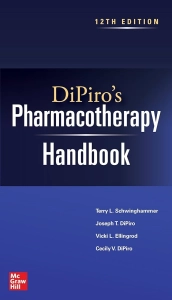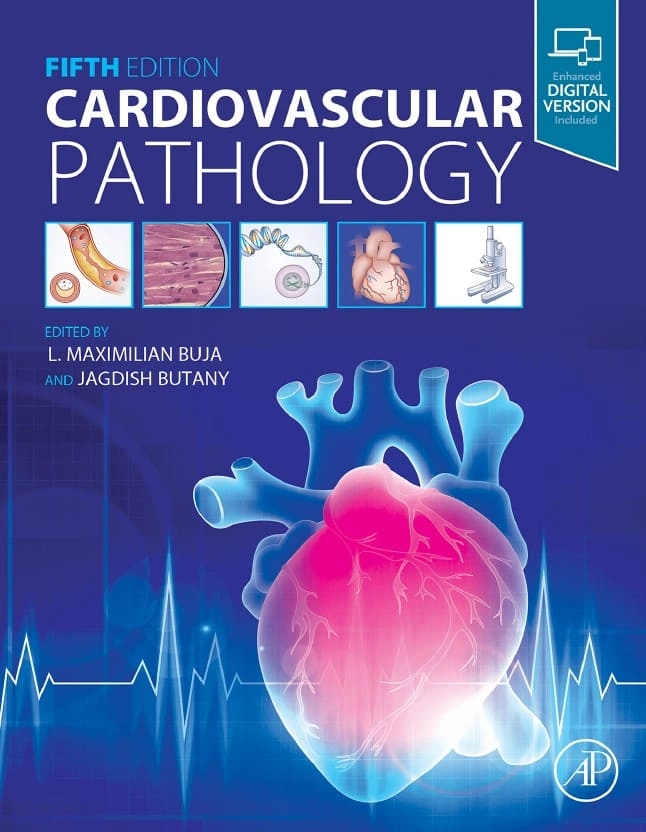 Download DiPiro’s Pharmacotherapy Handbook (12th edition) by Terry L. Schwinghammer, Joseph T. DiPiro, Vicki L. Ellingrod, and Cecily V. DiPiro.
Download DiPiro’s Pharmacotherapy Handbook (12th edition) by Terry L. Schwinghammer, Joseph T. DiPiro, Vicki L. Ellingrod, and Cecily V. DiPiro.
The Pharmacotherapy Handbook by Terry L. Schwinghammer, Joseph T. DiPiro, Vicki L. Ellingrod, and Cecily V. DiPiro, now in its 12th edition, remains a cornerstone reference for pharmacy students, clinicians, and healthcare professionals alike. As a concise yet comprehensive guide to the principles and practice of pharmacotherapy, this edition continues the tradition of offering practical, evidence-based guidance for managing a broad array of disease states.
One of the most notable features of this edition is its focused and streamlined presentation of pharmacotherapy principles. Each chapter is organized around specific disease states, beginning with a brief overview of the pathophysiology before diving into treatment strategies. This structure is especially effective because it allows readers to quickly access relevant information on therapeutic goals, drug recommendations, and patient care considerations, which is critical for busy healthcare professionals. The book’s layout also makes it an ideal companion for students preparing for exams, as well as a quick-reference tool for pharmacists and clinicians in practice.
A standout aspect of the 12th edition is its emphasis on patient-centered care. This approach is woven into every chapter, highlighting how pharmacotherapy should be tailored to individual patient needs and circumstances. Case studies and clinical pearls are frequently used to illustrate real-world applications of pharmacotherapy decisions, helping readers understand the importance of personalization in medication management. This is especially useful for students and trainees who need to bridge the gap between theoretical knowledge and clinical practice.
The updated content in this edition is another key strength. Given the rapid advancements in pharmacotherapy, particularly in areas like biologics, oncology, and immunotherapy, the inclusion of the latest research and treatment guidelines is invaluable. The authors have made a concerted effort to incorporate current clinical guidelines and evidence-based recommendations, ensuring that readers are working with the most relevant and up-to-date information. This makes the handbook not only a trusted resource for core therapeutic areas but also for emerging treatments and novel drug classes.
One of the book’s greatest assets is its accessibility. Despite covering a wide range of topics, from cardiovascular diseases and diabetes to psychiatric disorders and infectious diseases, the handbook maintains a clear, concise writing style. The authors use plain language where possible, avoiding unnecessary jargon, which makes the material more approachable, even for those early in their careers or those outside pharmacy practice who may need a crash course in pharmacotherapy. Additionally, the use of summary tables, treatment algorithms, and dosage guidelines helps break down complex information into digestible, actionable steps.
Furthermore, while the case studies and clinical pearls provide practical insights, more complex, multifactorial cases could further enhance the real-world applicability of the handbook. This would give readers an even deeper understanding of how to manage patients with multiple comorbidities or those on complicated medication regimens, which are increasingly common in clinical practice.
In terms of design and usability, the 12th edition excels with its quick-reference features. Chapters conclude with key points that summarize the most important takeaways, making it easier for readers to review core concepts quickly. The inclusion of updated drug information, along with considerations for special populations such as pediatrics, geriatrics, and pregnancy, ensures that the handbook is applicable across various patient demographics.
Contents
- Introduction
- Bone and Joint Disorders
- Cardiovascular Disorders
- Dermatologic Disorders
- Endocrinologic Disorders
- Gastrointestinal Disorders
- Gynecologic and Obstetric Disorders
- Hematologic Disorders
- Infectious Diseases
- Neurologic Disorders
- Nutrition Support
- Oncologic Disorders
- Ophthalmic Disorders
- Psychiatric Disorders
- Renal Disorders
- Respiratory Disorders
- Urologic Disorders
Download DiPiro’s Pharmacotherapy Handbook (12th edition) by Terry L. Schwinghammer, Joseph T. DiPiro, Vicki L. Ellingrod, and Cecily V. DiPiro in pdf from following download links.
Password for Download Links: biology.com.pk
File Size: 22.7 MB. Pages: 1043. Download Instructions. Kindly read the disclaimer.
You can also purchase DiPiro’s Pharmacotherapy Handbook (12th edition) by Terry L. Schwinghammer, Joseph T. DiPiro, Vicki L. Ellingrod, and Cecily V. DiPirofrom Amazon by clicking the image below.
You may also like to download the following books:
- Goodman and Gilman’s The Pharmacological Basis of Therapeutics (14th Ed.) by Laurence Brunton and Bjorn Knollmann
- Pharmacology: An Introduction (8th Ed.) by Henry Hinter, Barbara Nagle, Michele Kaufman, Hannah Ariel and Yael Peimani-Lalehzarzadeh
- Rang and Dale’s Pharmacology (9th Ed.) by James M. Ritter, Rod Flower, Graeme Henderson, Yoon Kong Loke, David MacEwan, and Humphrey P. Rang
Download Hundreds of Best-Selling Biochemistry, Biology, Botany, Medical, Microbiology, Psychology and Sociology Books from Download Books.
Happy studying!





